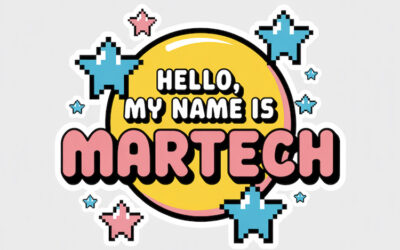AI-Skilled Buyers Disrupt B2B Martech Sales
- AI-skilled buyers compress vendor evaluation from months to 15-minute decisions using sophisticated research prompts that bypass traditional marketing touchpoints
- 89% of B2B buyers now use AI, but competency gaps create dramatic outcome differences between strategic users and basic searchers
- Traditional marketing metrics fail to capture AI-assisted buying behavior while conversions from AI recommendations increased 436%
- Vendors must structure content for AI discovery and build transparency-first processes to compete for sophisticated buyers who set specific parameters
As if your job wasn’t tough enough already. You’re trying to hit higher quota targets while managing longer sales cycles, shrinking budgets, and prospects who ghost after three discovery calls. Now you’ve got a new challenge that’s making all of that look easy.
Your dream prospect signed with a competitor. No form fills, no demo requests, no sales conversations. They researched, evaluated, and decided in 15 minutes using AI tools while your team optimized landing pages and crafted nurture sequences for buyers who no longer exist.
AI-skilled buyers outmaneuver traditional vendor strategies through sophisticated research techniques that most marketers don’t understand and can’t track.
The 15-Minute Vendor Switch
TrustInsight.AI’s Chris Penn demonstrates exactly how this plays out in practice. When a SaaS vendor raised prices, Penn asked Gemini Deep Research a strategically crafted question: “Identify five alternative providers, ranked by price and fit.”
The result? “In 15 minutes, it gave me a list of five new vendors, all of which had price decreases compared to the vendor I was working with, and I switched to a vendor off the list.”
Penn cut infrastructure costs in half while doubling service output. The original vendor never knew why they lost the business. The new vendor has no idea why they gained it.
Instantaneous, AI-driven decision-making bypasses every traditional touchpoint your marketing team depends on.
The AI Competency Divide
Research shows 89% of B2B buyers now use AI in their purchasing process, but there’s a massive competency gap between sophisticated users like Penn and buyers who treat AI like a search engine.
AI-skilled buyers understand:
- How to craft prompts that deliver strategic vendor comparisons
- What business context to provide for accurate recommendations
- How to challenge AI outputs and probe for gaps
- When to trust analysis versus when to dig deeper
Basic AI users ask simple questions:
- “What’s the best marketing automation platform?”
- “Compare HubSpot vs. Salesforce”
- “Find CRM options under $50/month”
The difference in outcomes is dramatic. Sophisticated buyers compress buying cycles from months to minutes while making better-informed decisions. Basic users get generic recommendations that miss critical business requirements.
Your Transparency Problem
Companies hiding pricing behind “call us” walls won’t make it onto AI-generated shortlists. The AI isn’t going to pick up a phone and wait for sales reps to respond.
As Penn explains: “If I said I want a new CRM, and the cost has to be $30 a month per user per seat or less, and you don’t have pricing on your website, guess what? You don’t make the list anymore.”
AI-skilled buyers set specific parameters:
- Budget constraints
- Feature requirements
- Integration capabilities
- Implementation timelines
If your information isn’t accessible and searchable, you’re automatically disqualified before a human even sees your brand.
The Invisible Buyer Crisis
Traditional marketing metrics can’t capture AI-assisted buying behavior. Buyers research through AI tools, compare options through conversational interfaces, and make decisions through self-service portals.
Your marketing dashboard shows:
- No inbound traffic spikes
- No content downloads
- No demo requests
- No sales conversations
Meanwhile, competitors gain customers through AI-mediated discovery while you optimize funnels for buyer journeys that no longer exist.
The shift has already created a measurable impact: sales conversions driven by ChatGPT recommendations increased 436%, while traditional lead generation struggles with declining conversion rates.
Structuring Content for AI Discovery
Make Information AI-Accessible: Structure content for AI discovery and analysis. Provide clear pricing, detailed feature comparisons, and implementation requirements. AI tools favor comprehensive, well-organized information over marketing copy.
Optimize for Strategic Prompts: AI-skilled buyers ask sophisticated questions. Your content must answer queries like “Compare integration capabilities across customer data platforms for retail companies with $50M revenue” rather than generic feature lists.
Challenge Buyer Assumptions: As Penn warns: “These incredibly powerful tools come with no manual. It’s like getting a chainsaw with no manual.” Even sophisticated buyers need guidance on what questions to ask and what context matters for their specific situation.
Build AI-First Sales Processes: When buyers do engage, they arrive pre-informed with AI-assisted vendor evaluations. Sales conversations must focus on validation, customization, and trust-building rather than information delivery.
The Strategic Inflection Point
The martech industry faces a permanent structural shift. Traditional demand generation approaches lose effectiveness as buyers spend 83% of their time researching independently, while AI-skilled buyers create an entirely new competitive dynamic.
The winners will be vendors who recognize three strategic realities:
- AI buyer competency directly correlates with deal quality. Tier 1 buyers make faster decisions, require less sales support, and typically represent larger opportunities.
- The competency gap creates a temporary competitive advantage. While most vendors optimize for traditional buyer journeys, early movers can capture the most sophisticated buyers before competitors adapt.
- As AI capabilities expand and Millennials/Gen Z comprise 65% of B2B decision-makers, the Tier 1 buyer segment will grow rapidly. Building relationships with AI-skilled buyers now establishes market position for the next decade.
Your Move
The “15-minute vendor switch” represents your new competitive reality. Sophisticated buyers make strategic decisions through AI-assisted research while your marketing team optimizes touchpoints that buyers will never use.
Your strategic choice: adapt your vendor strategy for buyers who’ve mastered AI research tools, or keep perfecting demand generation approaches for a shrinking market segment that still fills out lead forms.
About the Author
Digital Mindshare LLC (Digital Mindshare), sponsor of How Marketing Technology Works®, is led by Gene De Libero, a Martech Healer with over three decades of experience helping organizations and leaders ‘Ride the Crest of Change.’ Digital Mindshare is a New York-based Marketing Technology Transformation® consultancy that helps clients optimize their martech investments, ensuring maximum returns and strategic alignment.
New Knowledge
Strategic AI Implementation for Marketing Teams
How Marketing Technology Works®Advertising Policy Most marketing teams use AI wrong, focusing on volume over strategy. Learn how strategic AI implementation builds competitive advantages Stop AI efficiency theater. Discover how strategic AI...
Martech Value: Find Hidden ROI in Your Marketing Technology
Your martech might deliver substantial business value through operational efficiency, customer experience improvements, and strategic capabilities that traditional measurement approaches miss entirely. This article shows you how to investigate hidden value areas, gather compelling evidence, and communicate impact to secure continued investment. [Reading time: 7 min]
Enterprise AI That Learns: Marketing Leader Success Guide
Your enterprise AI initiatives keep failing because you’re building static tools instead of systems that learn. This guide shows marketing leaders how to implement AI that remembers campaign results, adjusts based on performance, and improves over time through proven partnership strategies. [Reading time: 7 min]
Digital Experience Platform vs CMS: Why Simple Terms Win
Your team faces overwhelming martech complexity when analyst-driven digital experience platform terms replace familiar content management language. Learn why simplifying terminology accelerates better purchasing decisions. [Reading time: 4 min]






